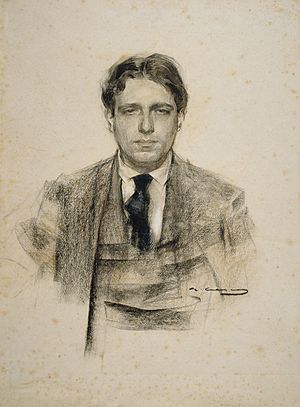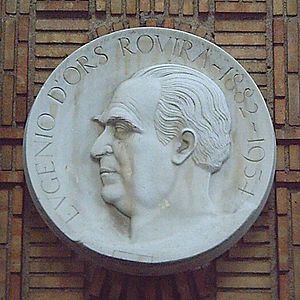Eugenio d'Ors facts for kids
Eugenio d'Ors Rovira (born in Barcelona on September 28, 1882 – died in Vilanova i la Geltrú on September 25, 1954) was an important Spanish writer. He was also an essayist, journalist, philosopher, and art critic.
Eugenio d'Ors wrote in two languages: Catalan and Spanish. Sometimes, he used the pseudonym Xènius.
About His Life
Eugenio d'Ors was born in Barcelona in 1882. When he was young, he joined the modernist literary groups. These groups focused on new ways of writing and art. He was part of this artistic movement from age 19 to 25.
He studied law in Barcelona. Later, he earned his PhD degree in Madrid.
In 1906, he started writing for a newspaper called La Veu de Catalunya. He also became a member of a Catalan cultural movement called Noucentisme. This movement aimed to bring new ideas and order to Catalan culture.
In 1911, he became the secretary of the Institut d'Estudis Catalans. This is an important institution for Catalan studies. In 1917, he directed the Public Education department for the Mancomunitat de Catalunya. This was a group of Catalan provinces working together. He left this role in 1920 after the death of Enric Prat de la Riba.
In 1923, Eugenio d'Ors moved to Madrid. He became a member of the Real Academia Española in 1927. This is the official royal institution for the Spanish language.
During the Spanish Civil War in 1938, he worked for the government in Burgos. He was the General Director of Fine Arts.
Eugenio d'Ors had a son named Álvaro d'Ors. Álvaro became a well-known Spanish expert in law and history. Eugenio d'Ors was also the grandfather of Juan d'Ors.
His Writings
Eugenio d'Ors wrote many books and essays. Here are some of his works:
In Catalan Language
- La fi d'Isidre Nonell (1902)
- Gloses de quaresma (1911)
- La ben plantada (1911)
- Gualba la de mil veus (1911)
- Oceanografia del tedi (1918)
- La vall de Josafat (1918)
- Gloses de la vaga (1919)
In Spanish Language
- Estudios de arte (1932)
- Introducción a la vida angélica. Cartas a una soledad (1939)
- Novísimo glosario (1946)
- El secreto de la filosofía (1947)
- La verdadera historia de Lidia de Cadaqués (1954)
See also
 In Spanish: Eugenio d'Ors para niños
In Spanish: Eugenio d'Ors para niños
 | Ernest Everett Just |
 | Mary Jackson |
 | Emmett Chappelle |
 | Marie Maynard Daly |



